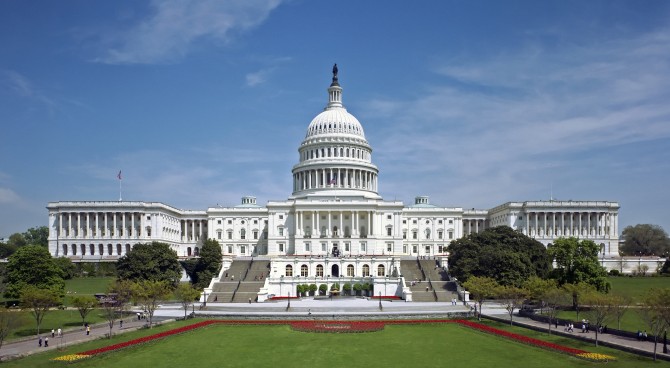Johnson can keep the GOP united by proposing a bill ending every Democrat-supported malady at once.
By Michael Solon
ET
Now that Mike Johnson has been narrowly re-elected speaker, House Republicans are focused on using the reconciliation process to extend President Trump’s 2017 tax cuts and control the border. They are less focused on the greatest risk to Mr. Johnson’s position: the fiscal 2025 appropriations process.
When Republicans took control of the House in 1995 for the first time in 40 years, Speaker Newt Gingrich tried to pass each appropriations bill individually—roughly 12 bills each year. But internal party divisions meant he rarely enjoyed GOP majorities on initial passage, leading to internal political strife. Partially spurred by these difficulties, later Republican speakers started abandoning the normal appropriations process and packed the bills together into omnibus bills. But Republicans increasingly opposed these omnibus bills, requiring speakers to court Democrats’ votes by incorporating Democratic priorities. As this process continued, Republican speakers lost more support within their own party.
The result? Since 2003 House Democrats have had one speaker, Nancy Pelosi. House Republicans have had five: Dennis Hastert, John Boehner, Paul Ryan, Kevin McCarthy and Mr. Johnson.
Like his predecessors, Mr. Johnson has struggled with the spending process. He barely passed six appropriations bills through the House for fiscal 2024. He then had to postpone votes on fiscal 2025 appropriations due to insufficient Republican support, relying instead on two continuing resolutions to keep the government open through March 14 this year. When the continuing resolution runs out, what will Mr. Johnson do?
He should listen to advice credited to Gen. Douglas MacArthur: “Never give an order that can be understood; always give orders that cannot be misunderstood.” Rather than proposing an omnibus bill that Republicans might support, Mr. Johnson must propose a bill that Republicans can’t oppose. Every controversial social and economic malady that Democrats have pushed should be targeted by the omnibus. Mr. Trump has rescinded some of these policies through executive orders, but overturning them legislatively is a far more lasting solution.
First, the omnibus must ban taxpayer funding for transgender hormone treatments and surgeries, as well as for schools and other organizations that allow males to compete on girls’ or women’s sports teams. It should pare back government spending and repeal the worst of Joe Biden’s regulatory agenda. No Republican who fears a primary challenge will oppose these provisions.
The omnibus bill must disavow the Paris Agreement, repeal electric vehicle mandates and depoliticize U.S. banking laws. It also should affirm Mr. Trump’s recent withdrawal from the Organization for Economic Cooperation and Development’s global corporate minimum tax deal, which would disproportionately hurt American corporations.
Another important provision would be reining in antitrust activities by the Justice Department and Federal Trade Commission. The European Union is experiencing a technological dead zone, in large part due to strict antitrust regulations that stifle innovation and deter new entrants to the market. Mario Draghi, a former prime minister of Italy, noted in September that “only four of the world’s top 50 tech companies are European.”
In the U.S., the guiding principle for antitrust is the consumer-welfare standard, whereby regulators evaluate businesses’ actions and mergers based on how they affect consumers. The omnibus bill should ban EU-style antitrust standards, reverse Biden-era rules bogging down mergers with regulatory requirements, and codify the consumer-welfare standard into law.
Next, the bill should block U.S. banking agencies’ proposed July 2025 implementation of international bank capital requirements, which would impose higher requirements on American banks than on their European counterparts. The omnibus should also repeal the Corporate Transparency Act, which compromises privacy by requiring small businesses to disclose sensitive information about their beneficial owners.
Finally, the omnibus should require Democrats to answer for past failures such as the 2010 Dodd-Frank Act, which responded to the financial crisis by imposing excessive burdens on banks, including increased capital requirements and greater oversight from regulatory agencies. According to the Congressional Research Service, more than 1,300 new banks were opened in the U.S. between 2000 and 2009. From 2010 to 2024, that number was 83. Congress must demand that the Financial Stability Oversight Committee, created by Dodd-Frank to monitor bank standards, ease regulations to encourage new bank formation.
Though these fixes vary in popularity, all are crucial to prosperity. The immensely successful 2017 tax cuts would be effectively reversed by the global corporate minimum tax proposed by the OECD’s deal. Banking is boring until policies stifling new bank formation leave small businesses and consumers gasping for air. Spirit Airlines, which filed for bankruptcy in November, could still lose its pilots, attendants and passengers after its planned merger with JetBlue was blocked by the Biden administration. Retirees, pensioners and investors also can’t be happy about Alphabet’s stock, which plummeted after the DOJ successfully sued Google on spurious antitrust grounds.
For 30 years, House Republicans have endured the appropriations spending machine but never mastered it, generating eternal frustration and short-lived speakers. It’s time to re-engineer the process. Nowhere does the Constitution require that appropriations bills concern only spending and never policy.
But what about the 60-vote hurdle in the Senate? Because the bill would go after only the most unpopular progressive views, the burden would fall on the Democratic Senate leader to justify a filibuster that could shut down the government. Ultimately, Senate Democrats will extract concessions, ensuring that enough House Democrats vote for the final bill to counter lost House Republican votes. But at that point Mr. Johnson will have already secured a GOP majority on initial passage.
By locking in Mr. Trump’s executive orders as the law of the land, Congress can limit the vast shifts in business climate and social norms that occur after almost every presidential election. Mr. Johnson and the new Congress should begin this process with an omnibus bill that constrains government excess across social, financial and economic lines—one that no Republican can justify opposing.
Mr. Solon is an adviser with U.S. Policy Metrics and a former assistant to Senate Republican Leader Mitch McConnell.


